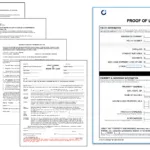Filing a homeowners or property insurance claim can be frustrating. Jumping into a claims process and dealing with insurance companies, adjusters, contractors, or attorneys immediately after your property is damaged can be a headache. Having your property damaged is already frustrating, and making an insurance claim and following it through to payment can be tedious. It’s not something you do every day, and it’s subject to nuanced and hard to understand state laws and regulations, as well as complicated policy terms. The good news, through, is that Arizona has strong policyholder protections built into the insurance law, and the insurance regulations provide strict deadlines and requirements for the investigation and payment of property insurance claims. If policyholders are aware of these deadlines and rules, and are proactive with respect to their claims, they should have a smooth, fast, efficient, and fair insurance claim process.
These resources are built to help policyholders — and all the stakeholders who work with them, like adjusters, attorneys, contractors, and consultants. These resources will help you file your claim correctly, document your losses thoroughly, and know when and how to followup through the claim process. And, if necessary, how and when to escalate and resolve the claim.
Filing Deadline
Promptly – Set by Policy
In Arizona, the deadline to make a property insurance claim is set by the language of the insurance policy itself, and the standard form says “immediately”. This generally means that a policy holder should inform their insurance of the loss as soon as reasonable after a loss occurs. Note, however, that a deadline for notification loss can’t be used to deny a claim if the insurer doesn’t show it was prejudiced by the delay.
Initial Response Time
10 working days
Arizona insurers are required to acknowledge the claim, and provide to the claimant with necessary claim forms, instructions, and reasonable assistance, within 10 working days of notification of loss.
Claim Decision Time
30 Days
In Arizona, the insurer must “complete investigation of a claim within 30 days after notification of claim.“
Lawsuit Deadline
1 Year
Absent a provision in the policy shortening the period, the deadline to file suit pursuant to a property insurance policy in Arizona is 6 years from the date the insurer denied the claim. However, Arizona allows the insurance companies to shorten this period to a period of not less than one year after the loss occurred.
State Department
Arizona Department of Insurance
100 North 15th Avenue, Suite 261
Phoenix, AZ 85007
Insurance Division: (602) 364-3100
Arizona DIFI website
File your Claim Now with ClaimSpot
ClaimSpot guides you through a quick, secure, and effortless filing experience.
It’s free. Let ClaimSpot Make Your Claim Fast & Easy.
Arizona Insurance Claim Guide
Arizona Insurance Frequently Asked Questions
These resources are specifically built to help policy holders, as well as the stakeholders that they work with. Below, you can find information that you can use to help make sure your claim is handled correctly from beginning to end, and learn the deadlines that you and your insurance company need to follow in order to ensure that your claim is processed smoothly, quickly, and efficiently. And, if necessary, how and when to escalate your claim and get paid.
In order to initiate a claim under a property insurance policy in Arizona, the policyholder must inform their insurance carrier that a loss has been incurred for which the policyholder is making a claim pursuant to their policy, and of the facts pertinent to the claim. This means that the only requirement to initiate the process is that the insurance carrier is told (either directly or through their insurance agent) that there has been a loss, some details about the loss, and that the policyholder wants to make a claim.
In many cases, an insurance company will call this communication a first notice of loss, or FNOL. In Arizona insurance law, this type of initial communication is called a “notification of claim”. While it can help to be as detailed as possible in the first communication with the insurer or agent, a notification of loss can be “any notification, whether in writing or other means, acceptable under the terms of any insurance policy or insurance contract, to an insurer or its agent, by a claimant, which reasonably apprises the insurer of the facts pertinent to a claim.”
Most insurance companies provide multiple ways to contact them after a loss to begin the claims process, these usually include:
1) Phone call (a number is usually provided on the insurance company’s website);
2) Online portal – many insurance companies have an online form to notify the claims department of a loss, this may even be through a mobile app;
3) Your agent – many insurance companies even have a different section of their website or phone number for an agent to inform them of a policy-holder’s loss;
4) Online software as a virtual assistant.
The claims process can generally be started easily, with just a quick communication to the insurer. However, the insurer will likely require more information and supporting documentation, including specific forms, to actually process and adjust the claim.
Luckily, Arizona law requires that the insurance company provide the claimant with “necessary claim forms, instructions, and reasonable assistance so that [the policyholder] can comply with the policy conditions and the insurer’s reasonable requirements” within 10 working days of receipt of the notification of claim.
Some things are pretty much universally the best practice after your property suffers damage. Whenever property damage occurs, and it looks like a claim under the insurance will be necessary, the insured should take steps to help ensure the claim processing will go smoothly.
These steps include:
1) Mitigate the damage, as soon as it is reasonable. This means protect the property and secure it against further damage when it is safe and possible to do so. Mitigation should only be just trying to keep the damage from getting worse, it does not mean that it is a good idea to jump directly into substantive repairs.
2) Inform the insurance carrier of the damage.
3) Determine if the covered damage exceeds the policy deductible by an amount sufficient to make a claim.
4) Cooperate with your insurance company, inspectors/adjusters, and other interested parties and communicate with them (and keep copies of all correspondence).
5) Make your property available for inspection as soon as it is safe and possible to do so.
6) Prepare supporting documents for your claim including:
a) Inventory list;
b) Description of damages;
c) Photographs and/or videos of the damage;
d) Receipts; etc.
Reporting Deadline: Arizona insurance law has no provision setting forth a specific deadline for a policyholder to provide notice of claim, however, pursuant to the “Arizona standard policy” for property insurance, the policyholder is required to give “immediate written notice” to the insurer of any covered loss for which a claim is being made. It is never a good idea to delay in providing the insurance company with information once it has been determined that a claim will be filed – delay in notifying the company of the loss can even result in a denial of some or all of the claim.
Be sure to check the language of the insurance policy to determine the notification or reporting deadlines. But, in any event, remember that best practice is to provide notice of the loss and claim to the insurer as soon as possible.
Documentation Deadline: Arizona does not provide a specific deadline for providing a Proof of Loss document, or other supporting documentation. Instead, these deadlines are contained within the insurance policy itself. Many Arizona insurance policies require a proof of loss to be provided within 60 days.
Note, however, that Arizona case law is protective of policyholders. Policy requirements to provide notice of loss or proof of loss within certain timeframes cannot be applied to deny a claim (even if there was no good reason for the delay) unless the insurance company can show that it was prejudiced by the failure, and the delay itself is insufficient to show prejudice. Similarly, a policyholder’s substantial requirement with the proof of loss requirements is sufficient, and strongly construed against the insurance company. Further, unless there is a specific policy provision stating otherwise, any proof of loss form can be used, not just one provided by the insurance company.
While the above is helpful in the event of some unavoidable or accidental delay, it is always best practice to provide a proof of loss document and support of the claim as soon as possible (while noting that the document only presents the knowledge at the time and may be amended or updated). Some deadlines for Arizona insurance companies start to run from receipt of a sufficient proof of loss, so getting one to the insurance company quickly is a good way to get the claim process moving along, and to get your payment.
Deadlines for Acknowledgment: Arizona has adopted laws governing claim settlement and investigation to protect policyholders and to provide a streamlined timeline for claims to be handled.
Once an insurer receives a notification of claim (see above), they are required to acknowledge the claim, and provide to the claimant with necessary claim forms, instructions, and reasonable assistance, within 10 working days.
Deadlines for Investigation: Arizona insurers are also required to comply with relatively strict investigation timelines. In Arizona, the insurer must “complete investigation of a claim within 30 days after notification of claim, unless such investigation cannot reasonably be completed within such time.”
Additionally, there are ongoing requirements regarding responsive communication from the insurer throughout the claims process. Arizona requires that the insurer respond to any communication by the policyholder that reasonably suggests a response is expected within 10 working days of the receipt of the communication.
Deadline for Acceptance/Denial: Arizona generally requires that the insurer must accept or deny the claim in whole or part within 15 days of receipt of a sufficient proof of loss document. This time period can be extended, but only if the insurer provides the policyholder with reasonable written reasons for the delay within the initial 15-working-day period, and then continues to provide updates every 45 days the claim remains open.
Deadline for Payment: Arizona generally requires that any approved portion of a claim must be paid within 15 days of the claim determination.
If an insurance company is determined to be in violation of the payment deadline above, Arizona law holds the insurer liable for interest beginning on the date they received notification of the claim.
Additionally, depending on the actions of the insurance company, a policyholder may be able to make a claim against the insurer for bad faith. In order to do so, the policyholder must show: (1) The absence of a reasonable basis for denying benefits of the policy; (2) The insurer’s knowledge or reckless disregard of the lack of a reasonable basis for denying the claim; and (3) Intent.
Deadlines to File Suit: Arizona has some interesting laws and interpretations regarding the deadline to file suit. Absent a provision in the policy shortening the period, the deadline to file suit pursuant to a property insurance policy in Arizona is 6 years from the date the insurer denied the claim. However, Arizona allows the insurance companies to shorten this period to a period of not less than one year after the loss occurred, and accordingly most do.
Interestingly, however, and similarly to the proof of loss deadline requirements discussed above, Arizona has case law supporting the position that even though shortened periods are allowed, they may not be enforceable in situations where the insurance company cannot show that they were prejudiced by the delay in filing suit. While it is always the best practice to comply with the stated deadlines, and not file late, there is some hope for policyholders in Arizona that a suit may be filed late if the insurer is unable to show prejudice due to the late filing.












